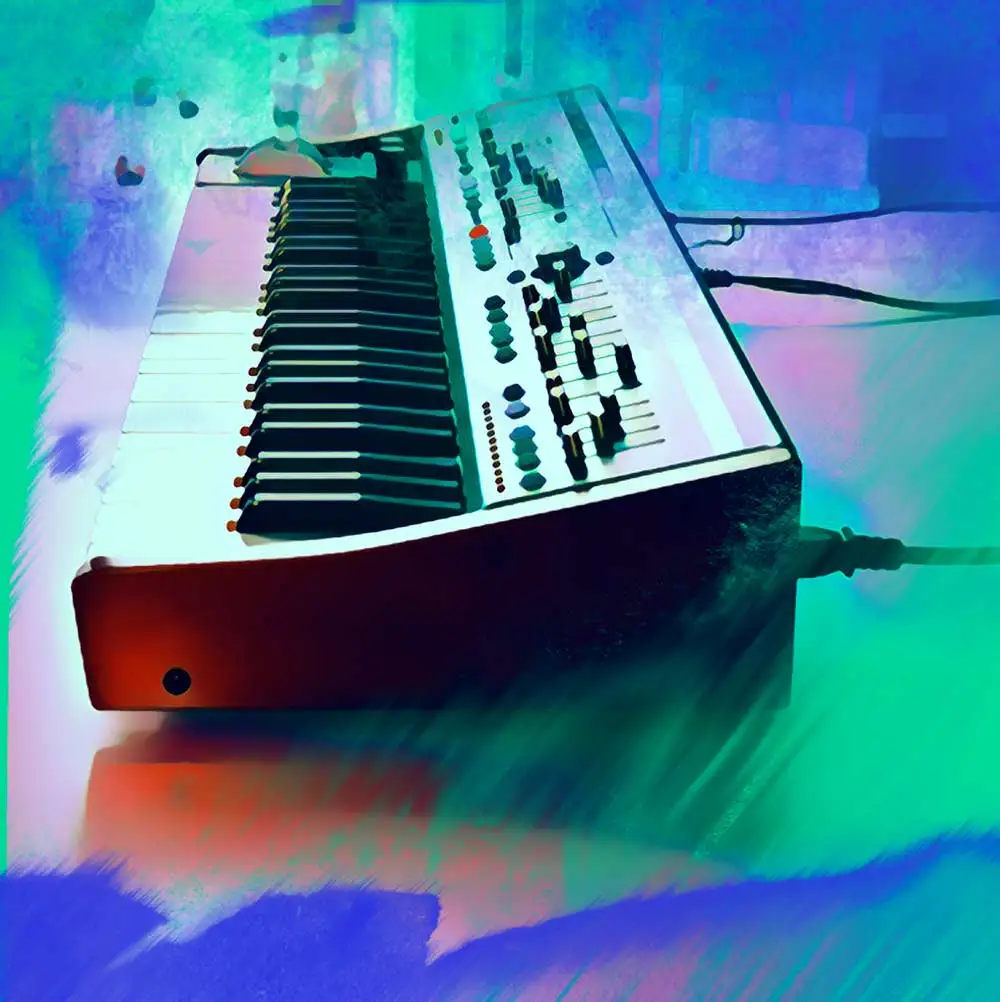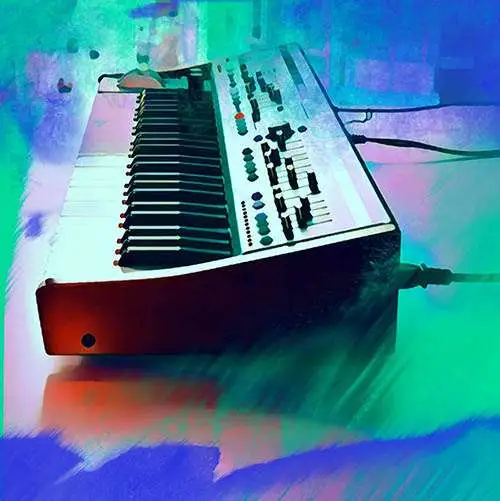Everyone knows you can make music using just your laptop and a DAW . But if you're serious about music production you'll want a better way of getting notes into your DAW than drawing them in with a mouse.
Enter the MIDI keyboard.
The best MIDI keyboards are more than just a way of getting notes into your piano roll. They'll change the way you work, speed up your process, and give you access to creative possibilities that you never knew existed. In a nutshell, they'll turbo-charge your production chops.
What Is A Midi Keyboard?
The first MIDI keyboards appeared on the scene in 1983. MIDI - Musical Instrument Digital Interface, if you want to use the full title, was developed as a way for electronic musical instruments to talk to each other.
Fast forward nearly forty years and it's more or less the same story. A MIDI keyboard is an interface that communicates with other devices, and software, using the standard MIDI protocol. It allows you to control notes, sounds, and other parameters in your DAW, or directly in your VST synths and plugins .
Midi Keyboard vs. Midi Controller
To put it somewhat confusingly, a MIDI keyboard is a MIDI controller, but not all MIDI controllers have a keyboard.
So what's the difference?
A MIDI keyboard will have, at minimum, a keyboard layout much like what you'd find on an acoustic piano, albeit with fewer keys. It may also include other controllers like pitch bend and modulation wheels, dials and faders, and even pads for triggering samples or playing drums.
A MIDI controller on the other hand won't have any black and white keys (or any other color). It might just be a set of faders, for controlling volume, or other parameters, in an incremental way. Or it could be a device with only pads on it. It still controls and lets you record MIDI information, but you won't be able to play it like Rick Wakeman plays the pinannah.
Can You Use Any Keyboard As A Midi Controller?
If your keyboard has a MIDI output, and you have a way of connecting it to your computer, then yes!
Nearly any keyboard you buy nowadays will have MIDI capability. It's just a matter of connecting it to your computer, either through a direct USB connection, a dedicated MIDI port, or via your audio interface . And voila! You have a MIDI controller.
It's worth noting though that the best midi keyboard controllers are built to be compatible with DAW and plugin instrument software. They're more than just a series of black and white keys that plays nicely with Logic, or Cubase.
In order to maximize your potential when making music, you're better off choosing a dedicated MIDI keyboard controller that gives you exactly the kind of music production power you need to knock out the next big hit. Think sliders, faders, transport controls, pads, and more.
So how do you choose a midi keyboard controller?
Things To Consider When Choosing A Midi Keyboard
First up, as I always recommend with any purchase, know your budget. There are a lot of options on the market and while that means there's a lot to choose from, it also guarantees there's a midi keyboard for every wallet. So decide what your ideal price range is before you start looking.
Portability
Are you mainly based in a studio, or do you like to make music on the move? If you like the idea of having your music production rig in a backpack so you're free to work from the beach (watch out for sand), Starbucks (other coffee is available), or the subway, you'll need a midi keyboard controller that fits in your rig bag. Perhaps you're planning to use the keyboard controller for Ableton Live on gigs. You could get away with a bigger controller, but it would still need to be lightweight enough to be portable.
Size of Keys
Some MIDI keyboard controllers come with mini keys (or 'slim' keys), making them more compact, but admittedly more fiddly to play. I'd suggest trying out both sizes of keys to see what each feels like. Mini keys may seem like a good idea for tracking on the road, but you may end up frustrated by the number of note clusters you accidentally play if you use them regularly in the studio.
Number Of Keys
MIDI keyboard controllers come in a range of sizes based on the number of keys they have.
How many keys do you need when you're recording parts? If you're playing fairly simple parts, like pads and bass lines, or triggering samples, you might only need a couple of octaves - one of the many 25-key models will suffice.
But it can get frustrating if the note you need is just off the end of the keyboard, and you're constantly using the octave-switch button to play parts. If you're studio-based, consider a 49-key or 61-key model. These sizes of controller keyboards are ample for most recording and programming situations.
Finally, if you come from a piano-playing background you may be more comfortable getting an 88-key controller , to give you the full range of the instrument you're playing - whether it's a piano VST or not. Another advantage with 88-key models is that you have easy access to any key switches built into instrument patches.
Weighted Keys
Another consideration is whether you want the keys to be weighted, semi-weighted, or 'synth action'. Piano players will probably prefer the action of fully-weighted keys, but that can make ripping synth lead lines harder to pull off.
On the flip side of that argument, synth-action keys (which have little to no weight behind them) while great for funky bass lines and the like, can make playing an expressive piano part an uphill battle. Semi-weighted is a good compromise in this situation, but ultimately you know best what you'll be using the controller for.
What Are You Looking To Control?
(Note: MIDI keyboard controllers cannot control in-laws).
Aside from having keys so you can plunk out the notes, what else will you use your controller for?
You might want a sustain pedal input, to help smooth out piano parts.
If you're playing synth VSTs you'll want pitch and mod wheels to add expressiveness while you're noodling.
Pads can be useful for programming drums. Not all pads are created equal though, so check to see if the pads are velocity-sensitive. Otherwise, your drum parts will end up sounding like Lars Ulrich.
If you're looking to do some deep sound massaging, you'll want an array of knobs and faders that can be assigned to different CC controllers on your plugins. The faders can also double up when it comes to the mix.
Or perhaps you don't want to faff around with programming for your favorite virtual instruments - in which case you'll want to look at controllers that have specific software compatibility.
DAW control in the form of transport buttons is not uncommon on MIDI keyboard controllers and can be a handy addition, especially if your controller is not within arm's reach of your computer.
Connectivity
Finally, look at how you're going to plug the controller into your computer, and if you need to connect any hardware synthesizers for playback. Some models come with 5 pin MIDI outputs for just this function.
Also, consider the power source for the keyboard. Many of the smaller controller keyboards are USB-powered. While this is great for portability, it can cause a drain on your laptop or tablet battery. You can use a powered USB hub to avoid this, or simply look for a controller that relies on its own power adapter.
OK, armed with all this (possibly sage) advice, let's take a look at the twelve best midi keyboard controllers around in 2022.
12 Best Midi Keyboards For 2022
1. Akai MPK Mini MK III
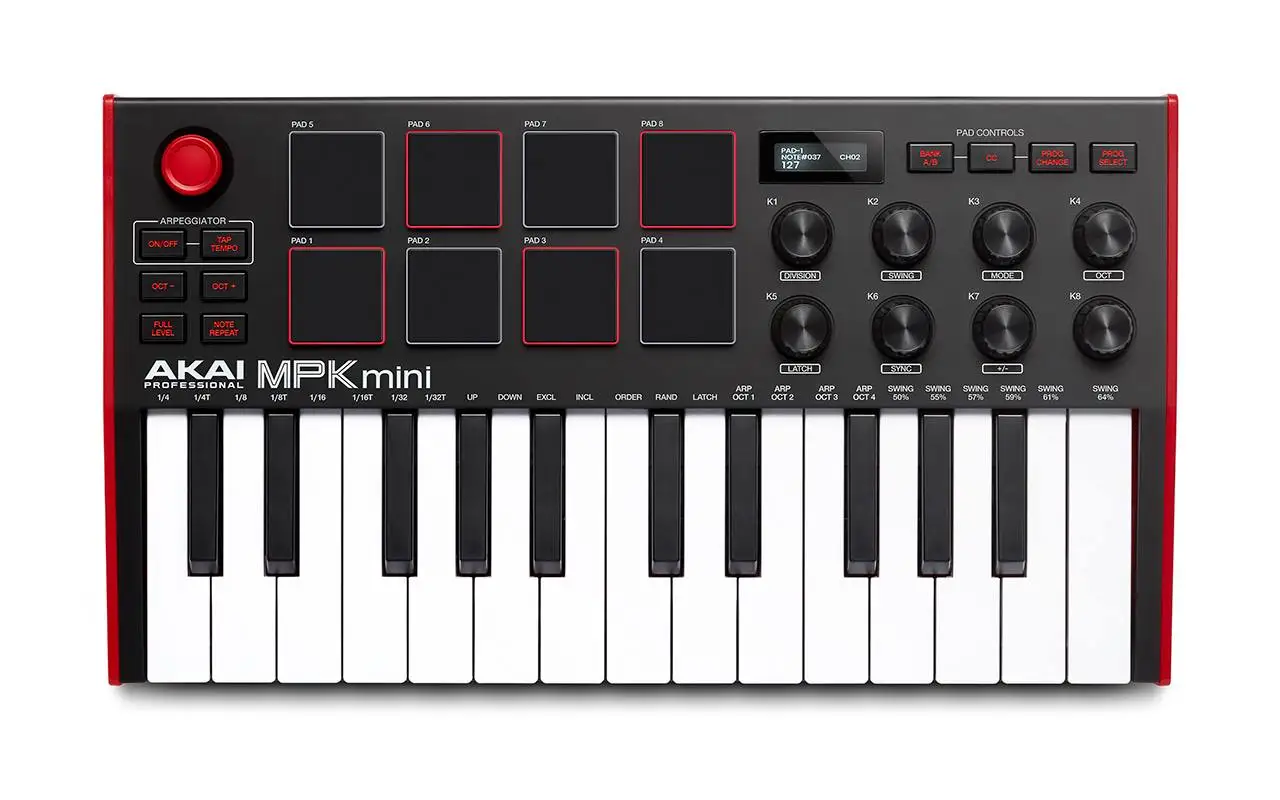
Quick Look
- 25-key, synth-action, velocity-sensitive keyboard
- 4-way joystick for pitch and modulation control
- 8 velocity-sensitive pads
- 8 assignable knobs
- Built-in arpeggiator modes
- Dedicated octave shift buttons
- Sustain pedal input
The Low Down
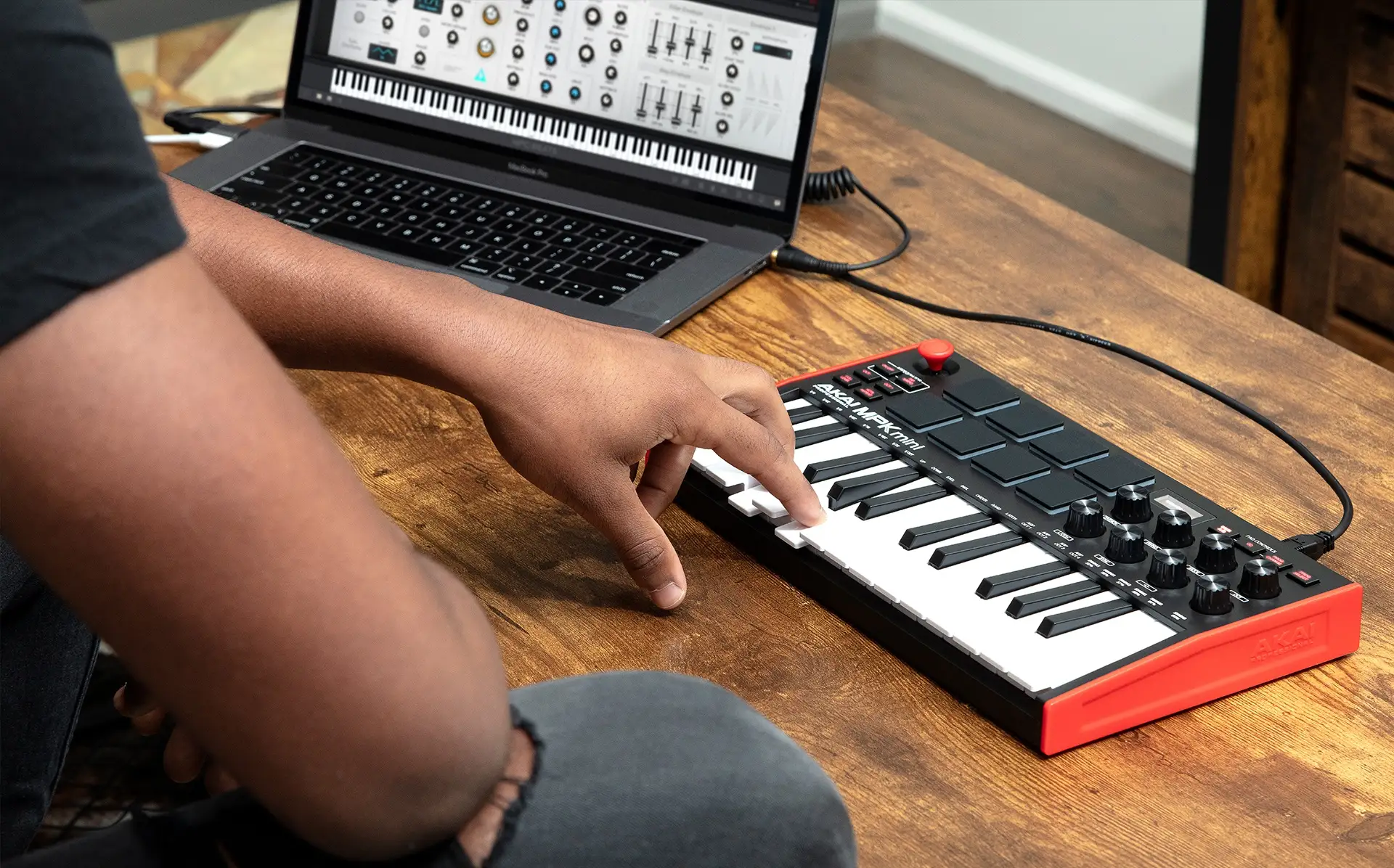
One of the smallest in the Akai Professional range of midi keyboard controllers, the MPK mini is a popular choice among laptop producers. Its compact size and portability make it an ideal choice for throwing into your backpack (literally - it's built with durability in mind) with your laptop and hitting the road.
This little fella has 25 mini keys - about 75% of the size of 'normal-sized' keys. This can make playing complex passages a little finicky, but with patience (and some judicious editing) you can make it work.
And hey, it's small enough that you can easily pull it out when you're 35,000 feet in the air en route to a new and exotic location, to start banging out some new tunes. So really, we mustn't grumble.
Despite the diminutive size of the keys, the action is pretty decent, and the velocity sensitivity allows for expression-laden playing. The same goes for the eight backlit pads. You can bypass this velocity sensitivity by using the 'Full Level' button to switch it on or off. Handy if you just want to bash out some percussion or synth pads.
Further control comes from the eight assignable infinity knobs. These can be assigned to pretty much any CC message or plugin parameter, giving you almost superhuman control over your music.
The pitch and modulation wheels on this controller are replaced with a fun little 4-way joystick that works on both parameters. It doesn't have a lot of range but gets the job done and you can always fine-tune the data in your DAW.
Speaking of software, the package bundle that comes with the Akai Mini includes MPC beats software and some great virtual instruments from Air Music Tech.
Notable Features
- Sustain pedal input
- Velocity-sensitive keys and pads
- Onboard arpeggiator modes
Novation Launchkey Mini MK3
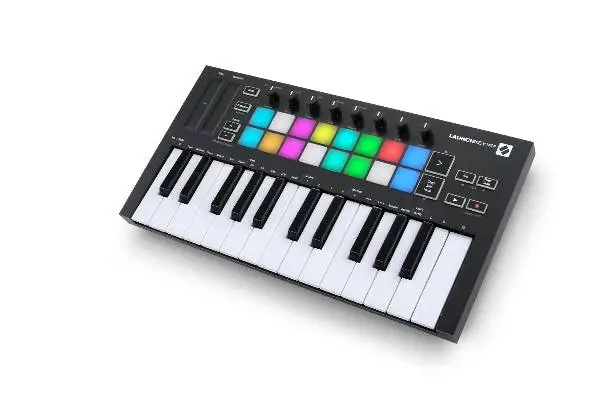
Quick Look
- 25-key, synth-action keyboard
- 16 velocity-sensitive RGB pads
- Fully controls Ableton Live
- Instantly maps to other DAWs
- 1/8" MIDI port
- 8 assignable rotary knobs
- Capture MIDI function
The Low Down
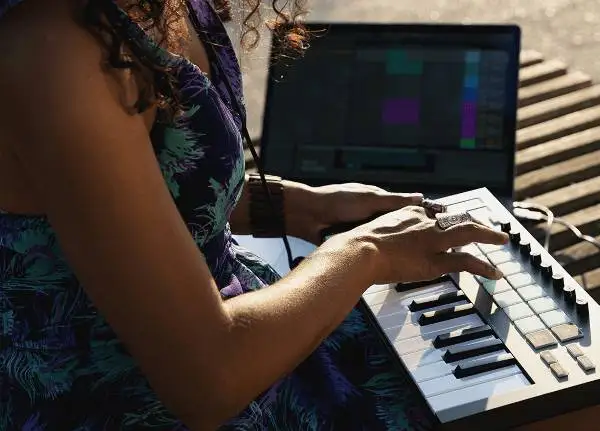
Another baby in a series, this offering from Novation packs a lot of power into a small space, especially if you're an Ableton user.
Perhaps the most surprising thing about this midi controller is the number of pads it offers - a whopping 16 - considering the modest two-octave range of the keyboard. Using Novation's RGB technology the pads can create pretty much any color in the visible spectrum. For Ableton producers it means you can see at a glance which clips are loaded, playing, and recording. For everyone else, it means you can color-code your pads to best suit your workflow.
More than just pretty lights though, these pads are velocity-sensitive and fully customizable. Use them for triggering samples, playing percussion, or switching window sets in your DAW.
An interesting feature is the modulation and pitch touch strips in place of the wheels found on most keyboards, giving you really tactile control over these parameters or any that you choose to assign to those controllers. Not that you'll really need to assign an alternate function to the mod wheel - there are eight assignable rotary controls located above the RGB pads.
There's a whole host of other features on this unit too. Some are Ableton-specific, like Scene Launch, Scene Up, Scene Down. There are also basic transport controls, and a nifty capture MIDI function, for those moments when you just forgot to press record while you noodled around.
With offerings from Spitfire, AAS, and Ableton Live, plus instruments and effects from other developers the software bundle that comes with this midi keyboard controller is pretty tasty.
While the manufacturer does state that this controller can be used with any DAW, its size and design towards pre-mapped control for Ableton make it one of the best midi keyboards for Ableton users on the move.
Notable Features
- Designed to work seamlessly with Ableton Live
- 16 RGB Pads
- MIDI Connectivity to hardware synths and devices
Alesis V25 MK II
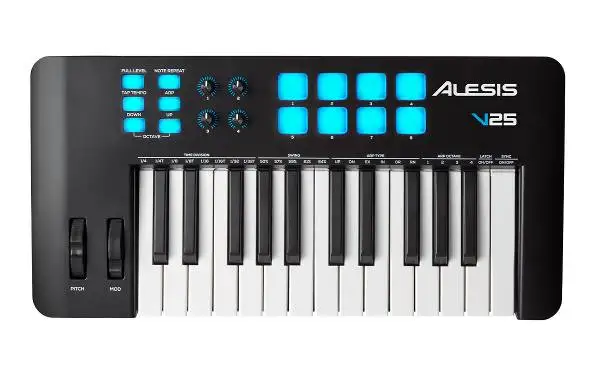
Quick Look
- 25-key, velocity-sensitive synth-action keyboard
- 8 velocity-sensitive LED backlit pads
- 4 MIDI-assignable knobs
- 6-mode arpeggiator function, with gate and swing controls
The Low Down
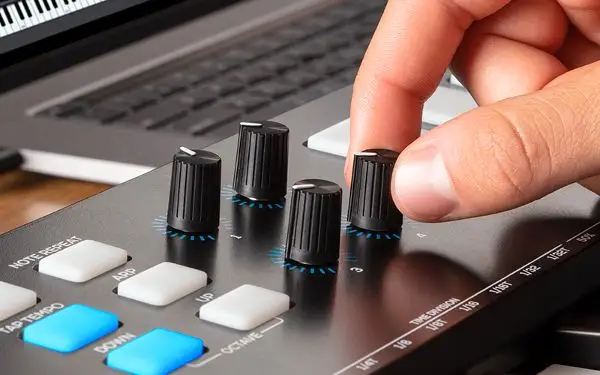
Alesis produce a whole s**t ton of musical equipment, including compact portable devices for producing music while on the move.
This lightweight keyboard controller is compatible with PC or Mac, and its simple interface and plug-and-play connectivity make it one of the best midi keyboards for beginners .
The synth-action keys are easy to play, while at the same being velocity-sensitive for expressive playing. Octave up/down buttons give you access to the full range of a piano, and the pitch and mod wheels give you further control over software instruments.
Eight drum pads can be used for programming percussion or triggering samples. These are velocity-sensitive, but have a Full Level and Note Repeat functionality for recreating the bombastic sounds of classic drum machines. Who needs dynamics anyway?
Get creative with the V25's Arpeggiator. With tap tempo, six modes, and adjustable time division, gate, and swing, you'll soon be composing inspired melodies and synth lines. And to add even more control to your production, the four rotary knobs next to the pads can be assigned to any MIDI function. Whether it's filter sweeps, volume and pan automation, or one of the myriad parameters on your software instruments, assign away and sculpt your sound.
Notable Features
- Sustain pedal input
- Full pitch and mod wheels
- MPC Beats production software
- 60 free piano lessons included
CME Xkey Air
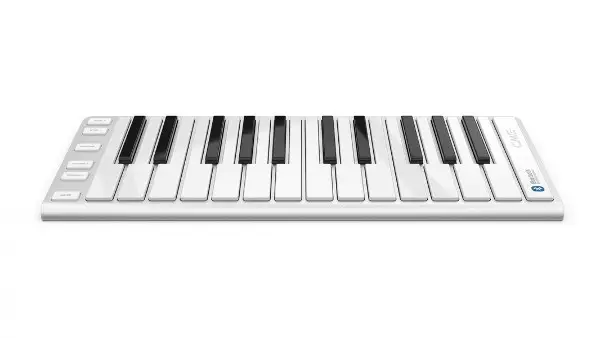
Quick Look
- 25 keys, with aftertouch
- USB software and Bluetooth connections
- USB MIDI class-compliant- works with nearly any device
The Low Down
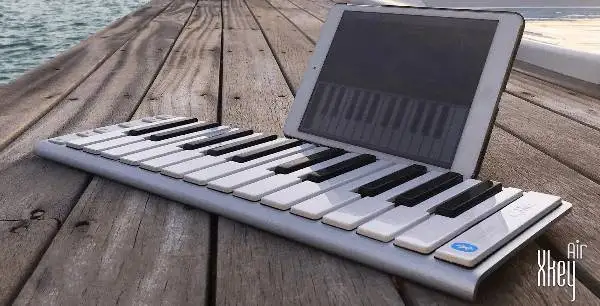
The CME XkeyAir is a midi controller built for musicians with a minimalist aesthetic. With a molded aluminum chassis this keyboard is a teensy 3.6mm thick and weighs in at just over 1 lb. Drawing power from its micro USB port, this is clearly designed for producers on the move, and the playability of this midi controller is surprisingly good for its size.
The 25 keys are full size and responsive no matter where your finger presses on the actual key. Full velocity sensitivity is complemented by polyphonic aftertouch capability. It's not often you find this on smaller models so this is a great feature.
There are no rotary controls or pads on the Xkey, but you can still control some parameters using the touch-sensitive control buttons on the left-hand side. There are octave up and down buttons at the top, followed by a modulation button, pitch up and down buttons, and a sustain button that functions in the same way as a sustain pedal would. The manufacturer's website claims the Xkey is fully customizable, so these buttons (in theory, at least) should be able to control other parameters too.
Again catering to musicians who like to make toons wherever they are, this extremely portable midi keyboard provides full plug-and-play compatibility with most operating systems. Connect your phone or other mobile devices and you can play hundreds of music-making apps to your heart's content.
While the Xkey lacks some of the features of other controllers in the 25-key range, its connectivity and portability make it one of the best portable midi controllers for those of you on the move.
Notable Features
- Bluetooth connection
- Class-compliant MIDI
- Super lightweight and portable
M-Audio Oxygen Pro Mini
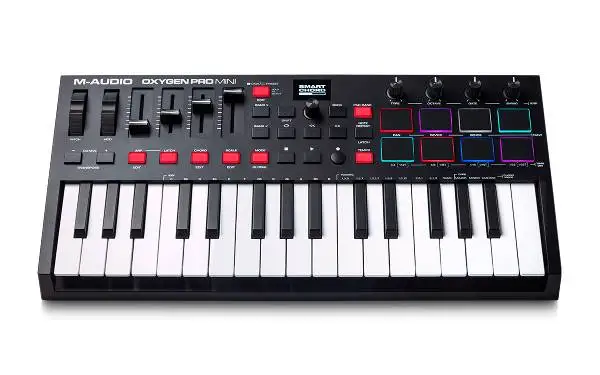
Quick Look
- 32-note semi-weighted mini keys
- 8 drum pads
- 4 assignable faders, knobs, and buttons
- Smart scale function means you can play like you learned theory
- Full-featured arpeggiator
The Low Down

This little brother to the Oxygen MKV61 (featured below) is a fantastic portable keyboard controller, with plenty of assignable controls and other gubbins to fuel any producer's creativity.
Remarkably, the 32 keys are semi-weighted so you don't have to sacrifice playability for portability. Admittedly they are mini-keys, but with the Smart Scale mode enabled you can easily work your way around any errant notes being triggered by the unfamiliar key size.
DAW integration is a breeze thanks to the onboard presets. Whether you use Ableton Live, FL Studio, Cubase, or any other major software, you can simply dial up the preset for that program and all the controls on the Oxygen mini will be automatically mapped, so you can spend more time making music and less time wondering what that button on the left does.
The eight velocity-sensitive backlit pads have a note repeat function, making them ideal for producing beats (a doddle in the included MPC Beats software), or triggering clips (Ableton Live Lite is also included in the box).
The Oxygen Mini also has faders, knobs, and buttons - four of each - to make controlling your virtual instrument plugins a more tactile experience. They come with preset maps for the included instruments from Air Music Tech but are also fully assignable so you can program them to fiddle with your favorite synths.
Add to this a full-featured arpeggiator, Midi output, pitch bend, mod wheels, and a sustain pedal jack, and you may begin to wonder what dark arts the folks at M-Audio mustered up to fit so much into such a small space.
Suffice to say for the producer on the move the Oxygen Pro Mini 32 is one of the best mini midi keyboards you can get. And when you consider how many features are on board, it's also great for the cost.
Notable Features
- Midi out via 1/8" jack
- Ableton Live included
- Auto-mapped DAW control
- Pro-quality feel with maximum portability
Nektar Impact GX 49
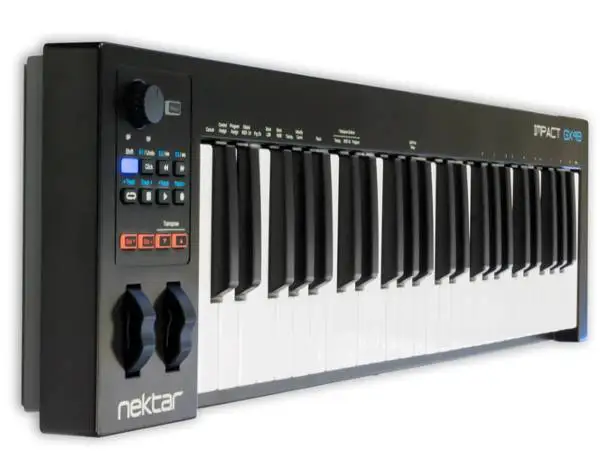
Quick Look
- 49-note, full-size, velocity-sensitive keyboard
- Dedicated DAW transport controls
- iPad compatible
- 7 assignable buttons
The Low Down
The Nektar Impact GX49 is a 49-note midi keyboard controller, with a host of assignable control options, and a dedicated transport control panel that integrates with pretty much any DAW. While it doesn't have the array of pads and rotary knobs available on other controllers, if you're looking for something that gives you excellent MIDI keyboard playability, and a streamlined way of operating your DAW the Nektar is worth a closer look.
The keys are typical for a 49-key model; full size, synth-action, and velocity responsive. You can even choose from four different velocity curves or one of the three fixed modes. The pitch bend wheel gives you access to all sorts of note-bending tricks, and the modulation wheel can be assigned to any MIDI CC message to control software instruments.
The same goes for the 1/4" pedal input on the rear of the unit. Think beyond just a regular sustain pedal, and use the assignable input for a breath controller, or plug in an expression pedal and control filter sweeps with your foot (try it; it's fun!).
The transport control panel offers DAW integration for any major DAW on the market - Digital Performer, Logic Pro, Cubase - as well as others like Garageband, Reason, Sonar, and, yes, even Reaper, and FL studio. If you happen to use software that isn't supported (who are you?) you can set up the MIDI control yourself.
Using a modifier button, the user can go beyond simple play, stop, and record functions, control the metronome, cycle/looping, rewind and fast-forward, step through patches and tracks, assign and go to locators, and control the volume. Oh, and view the mixer, instruments, and smart controls.
As if this wasn't enough these buttons can be assigned to send out MIDI CC messages too, along with the mysteriously-titled potentiometer. That's basically just a big knob on the top of the keyboard that can be used for anything, from volume automation, to ramping up the LFO rate on that nasty synth sound you have going on.
The Impact GX49s flexible programming and connectivity to Apple iOS means it could well be one of the best midi keyboards for Garageband users, whether in the studio or on the move. And if you need more keys, simply opt for the GX61 model!
Notable Features
- DAW transport controls
- Flexible MIDI CC assignability
- Octave and transpose up/down buttons
Arturia KeyLab MkI49
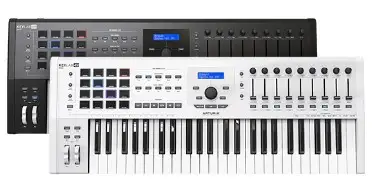
Quick Look
- 49-note keyboard with velocity and aftertouch
- 16 backlit pads
- 9 faders
- 10 assignable buttons
The Low Down
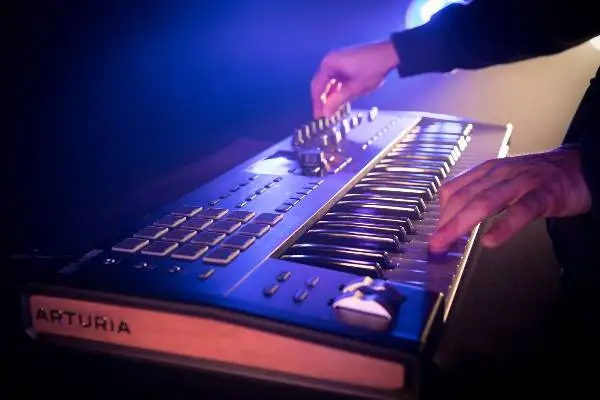
This rugged midi controller from top software company Arturia is well designed for both tour and studio duties. In addition to all the controls at your fingertips (and feet), this is a stylish offering, complete with wood side panels, and available in a choice of black or white finishes to suit your aesthetic. But enough gushing about how it looks. What does it do?
The Keylab is by far one of the best midi controllers out there, by virtue of its insane connectivity and integration possibilities.
The 49-note keybed (if you need more keys opt for the Keylab Mk II 61 model) is velocity-sensitive and responds to aftertouch. The semi-weighted keys mean you can play an electric piano line expressively and still let rip on some wild synth meanderings without being bogged down by weight.
The Keylab's 16 (yes, 16!) dynamic backlit RGB pads are fully programmable, and work in 3 different modes: Pad Mode, Chord Memory, and Chord Transpose. As you'd expect, Pad Mode can trigger sounds, samples, or loops. Chord Memory allows you to store chords of up to 6 notes in each pad, and Chord Transpose triggers pre-assigned chord shapes while playing single notes on the keyboard.
There are nine large faders to give your mixes a hands-on feel or use them to control organ drawbars. The nine rotary knobs can be assigned to any parameter too. As if that wasn't enough, there are pitch and modulation wheels, sustain and expression pedal inputs, and three additional aux pedal inputs. Surely only guitarists use that many pedals?
What about your prized Eurorack synth, sitting in the corner of your studio gathering dust? Fear not, for the Keylab has five control voltage connections on the rear of the unit, allowing you to control hardware synths from the comfort of your DAW.
And your DAW is not forgotten either. The Keylab includes 10 presets for the most popular recording software, plus standard Mackie HUI setups. Arturia helpfully includes magnetic overlays to help guide you around the controller when in DAW mode, so you won't forget what fiddly thing does what.
The software bundle includes Ableton Live Lite, Arturia's own Analog Lab 3, Piano V2, and the Arturia MIDI Control Center; this allows you to customize any of the Keylab controls for your software, and save them as templates. Given the vast programmability of the unit, and the lack of FL-specific integration options on other controllers, this could well be one of the best midi keyboards for fl studio users .
Notable Features
- 3 assignable auxiliary pedal inputs
- DAW-specific magnetic overlays
- CV/gate outputs
Novation Launchkey 49 MK3
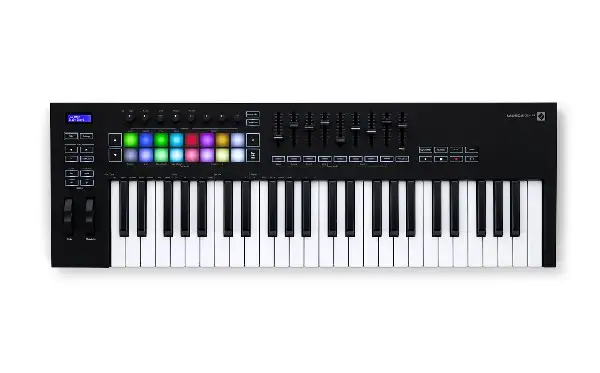
Quick Look
- 49-note velocity-sensitive keyboard controller
- Optimized for Ableton Live
- 16 backlit pads
- 8 rotary knobs, 9 faders
- Transport controls
- 5-pin Midi out for controlling external hardware synthesizers
The Low Down
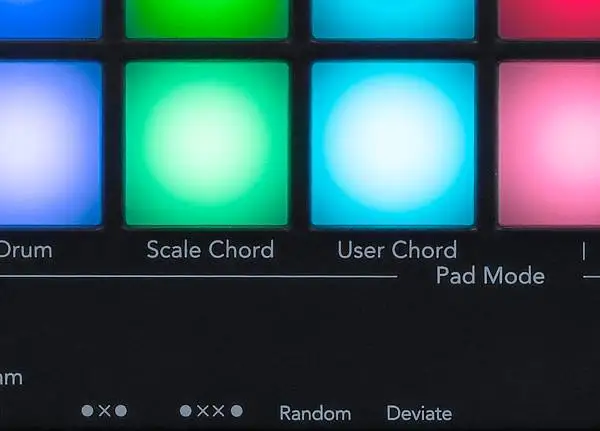
The Novation Launchkey 49MK3 USB MIDI keyboard is one of the bigger siblings to the Launchkey Mini, featured earlier.
Designed with the Ableton Live user in mind this midi controller also features DAW integration for other major programs, and comes with a large software bundle plus features and controls galore.
Unlike its little brother, the Novation Launchkey 49 comes with pitch bend and mod wheels to add flair to your playing. The synth-style action of the keys will make ripping out those fast synth lines seem effortless, while the touch-sensitive keys will ensure your playing is expressive enough to make even your mother cry. There are octave up/down buttons to extend the range of the keyboard when you need it.
Unsurprisingly, most of this midi controller's features are geared towards optimizing the Ableton Live experience. With quick access to functions like MIDI Capture, track arm, and scene launch, you'll be hopping around your Live sessions like a pro. If you're not an Ableton Live user the Novation Launchkey has full integration with Logic and Reason, plus native functionality with other major DAWs, so you can still make it your production command center.
More than just a DAW control though, the Launchkey has 4 custom modes, allowing you to map the keyboard's eight knobs, nine faders, and sixteen drum pads to any MIDI-compatible device. Yes, not only can you fiddle with your soft synths, but you can hook up your external hardware synthesizers and control them too.
In fact, the Novation Launchkey can be used in standalone mode, allowing you to leave the DAW at home while you make music on the road with your impressive all-hardware rig.
All in all, the Novation Launchkey 49 MK3 is one of the best MIDI keyboards for Ableton users who need a little more real estate to work with.
Notable Features
- Impressive software bundle
- Custom modes for controlling performance or studio rig setups
- Eight onboard scale modes
- Standalone mode can control your music-making without a computer
- NI Komplete Kontrol S61
M-Audio Oxygen MKV 61
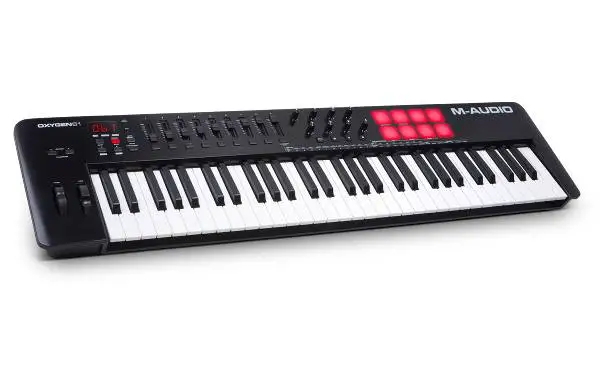
Quick Look
- 61-key midi controller
- 8 rotary knobs
- 9 faders
- 8 pads
- The software bundle includes Ableton Live Lite & instruments by Air Music Tech
The Low Down
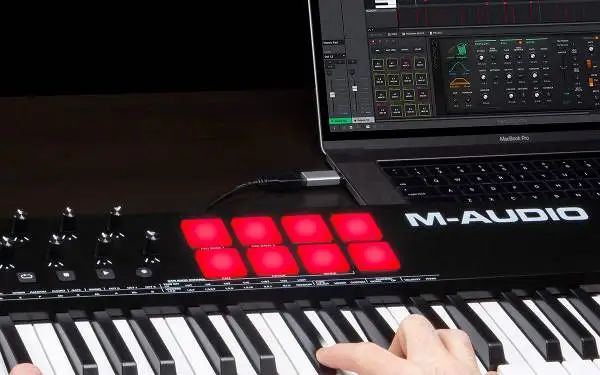
It's long been known that M-Audio makes some of the best midi keyboard controllers, and the new version of the Oxygen MK series could well prove to be the best midi controller on the market. Of course, all this depends on how you work, and what you need to produce effortlessly, so let's take a deeper dive into this machine and see what's inside the box.
The 61 full-size synth-action keys on the Oxygen 61 are velocity-sensitive, giving you full expression when you play those lyrical piano parts. If you find yourself running out of notes at the top or bottom of your range use the handy octave buttons to find more top end or the mysterious key switches that always seem to lurk around C0.
The eight velocity-sensitive backlit pads have two banks and feature a note repeater function - essential for those racing trap hi-hats, and just handy for beat production in general. Or use the drum pads to trigger clips in Ableton Live. For melodic elements, use the built-in arpeggiator to conjure up complex patterns effortlessly synced to your DAW.
Skipped music theory class? Fear not; M-Audio has your back, with smart chord and smart scale technology. Smart chord allows you to trigger full chords with single notes and has a custom mode to allow you to program more complex chords in, which are then mapped across the board.
The smart scale feature essentially prevents any notes that are not in the selected scale from being played, so now you can play that Ab pentatonic riff without having to tax the old grey matter. Both of these features have parameter access right on the keys, so you can easily change things on the fly.
The Oxygen provides built-in DAW integration for all major software - simply choose your preset and controls such as faders, transport buttons, and more, which will be automatically mapped to your system. Of course, all the sliders and knobs are assignable so you can map out the controls to best suit your workflow and control sounds in your plugin collection.
The included type B USB cable provides bus power, and there's a socket on the rear of the unit for a 1/4" sustain pedal. With the software bundle including Ableton Live Lite, Akai Professional MPC Beats, and virtual instruments from Air Music Tech, you have everything you need to start making music right out of the box.
With 61 keys, pre-mapped integration, a multitude of controls, and a great software bundle, the price makes the Oxygen 61 MKV one of the best budget midi keyboards on the market .
Notable Features
- Smart chord and smart scale options to easily play in any key
- Automapping of controls
- Pre-mapped factory presets for popular virtual instruments built-in
- Instant parameter feedback on the LED display
Akai MPK261
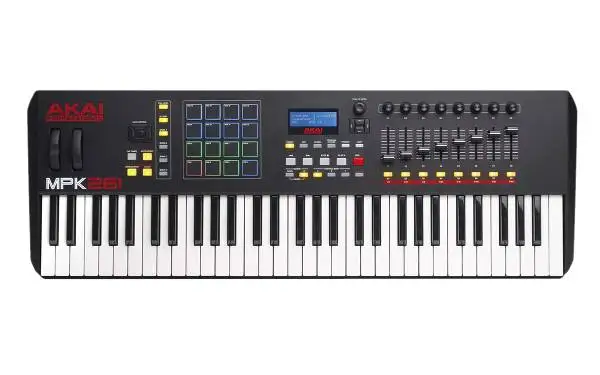
Quick Look
- 61-note semi-weighted keys with aftertouch
- 16 backlit pads, each with 4 banks
- 24 assignable faders, knobs, and switches (8 of each)
- Comprehensive transport and parameter controls for DAW integration
The Low Down
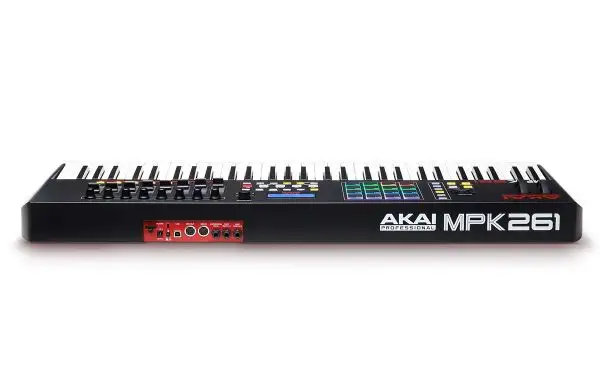
The MPK261 is one of the big brothers in the Akai Professional range of USB midi controllers, and its range of fully assignable controllers gives the user tons of options of DAW integration and plugin manipulation.
The semi-weighted action on the keyboard is a great middle-ground for players, giving you something to work with for piano parts while at the same time keeping things easy for fast synth passages. The addition of aftertouch is a great feature - not all controllers have it - and means you can add tasty modulation to your parts while your fingers are still on the keys.
With three pedal inputs, you can go even further. A dedicated expression pedal input gives you the opportunity to create swells as you play with both hands, whilst using the sustain pedal to smooth out your playing.
But the meat of this unit lies in its massive controller functions. There's full DAW control on a dedicated panel, and the presets option lets you flit between Logic Pro and Ableton Live (or any other DAW) at the flick of the switch. The sixteen RGB MPC style drum pads can be assigned in up to four bank configurations, allowing you to play finger drums (my favorite way of playing percussion) or trigger samples without having to re-program anything.
Each set of eight knobs, buttons, and faders can be expanded with three banks, making the switch from modulating plugin parameters to controlling the mix as easy as pie.
For producers with outboard noise boxes, you can control any hardware synthesizers from the 5-pin MIDI output on the rear of the unit. All power for the unit comes from the USB cable, although there is the option of using a power supply if you wanted to use the MPK261 as a stage rig running external synths.
Notable Features
- Excellent playability with semi-weighted keys and aftertouch
- Three footswitch inputs (including one dedicated expression pedal input)
- Multiple banks for all controls
- The software bundle includes Ableton Live Lite and instruments by Air music tech
- MIDI in/out connectivity
Native Instruments Komplete Kontrol S88

Quick Look
- 88-key, fully weighted, hammer-action keyboard
- Powerful integration with Native Instruments Komplete series
- 2 high-res color screens for visual feedback
- Pitch bend, modulation wheel, and touch strip controllers
- 2 assignable pedal inputs
The Low Down
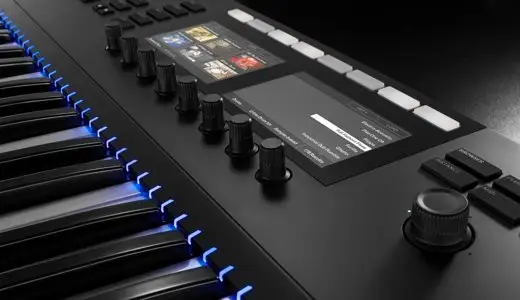
The largest of the Native Instruments keyboard controllers, the S88 is designed for those who want the feel of a real piano along with complete control over their software instruments. Obviously, it's designed with the NI family of instruments and effects in mind but the integration is open for other big players to include support for too.
Anyhoo, what makes this one of the best weighted midi keyboards on the market? IMHO, two things; the keybed, and the instrument integration.
The Fatar keybed gives the player a true piano feel when they gracefully plunk out tunes on the hammer action keys. Memory-foam damping adds to the realism when playing, so if you're coming from a piano-playing background this keyboard controller will make you feel right at home.
True, soaring synth lines may be harder to achieve, but for a fully expressive experience, this is hard to beat. If you need something that requires a bit less work for your fingers take a look at the S61 or S49 from this series, which both have semi-weighted keys.
With the two high-resolution screens, it's easy to work with your Komplete or NKS software instruments. From browsing patches to tweaking parameters, and more, the visual feedback these screens provide makes music production a breeze.
In terms of controls, the Native Instruments Komplete Kontrol has eight touch-sensitive control knobs underneath the screens, which are pre-mapped to the more common parameters in Komplete and NKS instruments. In addition to these, the unit has pitch and mod wheels, plus an assignable touch-sensitive strip, and two assignable pedal inputs on the rear of the unit.
There's a whole bunch of other features too. If you've still got MIDI modules lurking around your studio you can hook these into your system via the S88s MIDI in/out ports. The excellent transport controls on the top of the unit give you direct access to a large number of features in major DAWs, including cycle/loop, undo/redo, metronome.
There are RGB lights above each key to show you where those key switches are hiding, which notes play which drum cells, and what notes are in that obscure scale you just selected.
The smart chord feature allows you to play key-appropriate chords with just one finger, and likewise for arpeggios. And don't even get me started on the software bundle; a generous selection from the Komplete 13 collection, expansion packs, and Ableton Live Lite.
I could go on and on, but suffice to say the Native Instruments Komplete Kontrol is a great midi keyboard controller.
Notable Features
- Excellent software bundle included
- Integration for instruments by leading manufacturers
- DAW control
- Realistic piano feel
Kurzweil PC4 SE
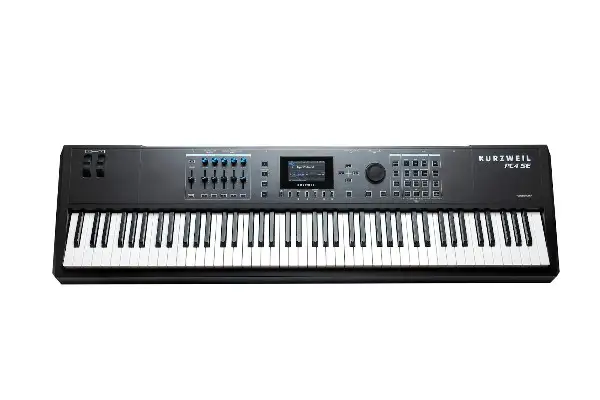
Quick Look
- 88-key, fully weighted workstation
- Transport controls
- 23 programmable controllers
- 2GB of instrument samples onboard
The Low Down
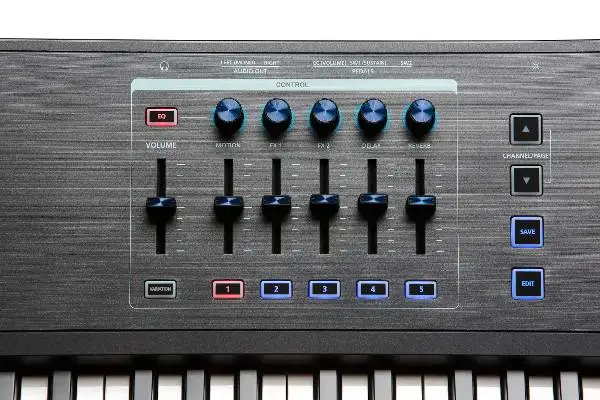
No overview of keyboard controllers would be complete without at least a glance at digital pianos that can also function as a midi controller. Kurzeil's PC4 SE is both a synth workstation and performance controller, in one affordable bundle. Designed for the performing artist and studio musician this solid keyboard features onboard sounds, effects, and a 16 track sequencer, as well as programmable sliders and rotary knobs.
Admittedly, with the workstation aspect of the unit, you're paying for more than just a midi controller here. 2GB of instrument samples make up the vast instrument library, which can be sweetened with the 32 FX units. The sound library can be edited, or built into splits, layers, or multis, and saved for use on stage or when recording.
If you're looking for one controller to rule them all there are more effective solutions on the market. But if you need control, playability, and sounds that travel with you to the stage the PC4 SE may be the best midi keyboard for you.
Notable Features
- 256 voice polyphony
- 1500+ onboard instruments and effects
- 2 x USB ports
- FM synth engine imports FM SysEx files from the '80s and '90s


